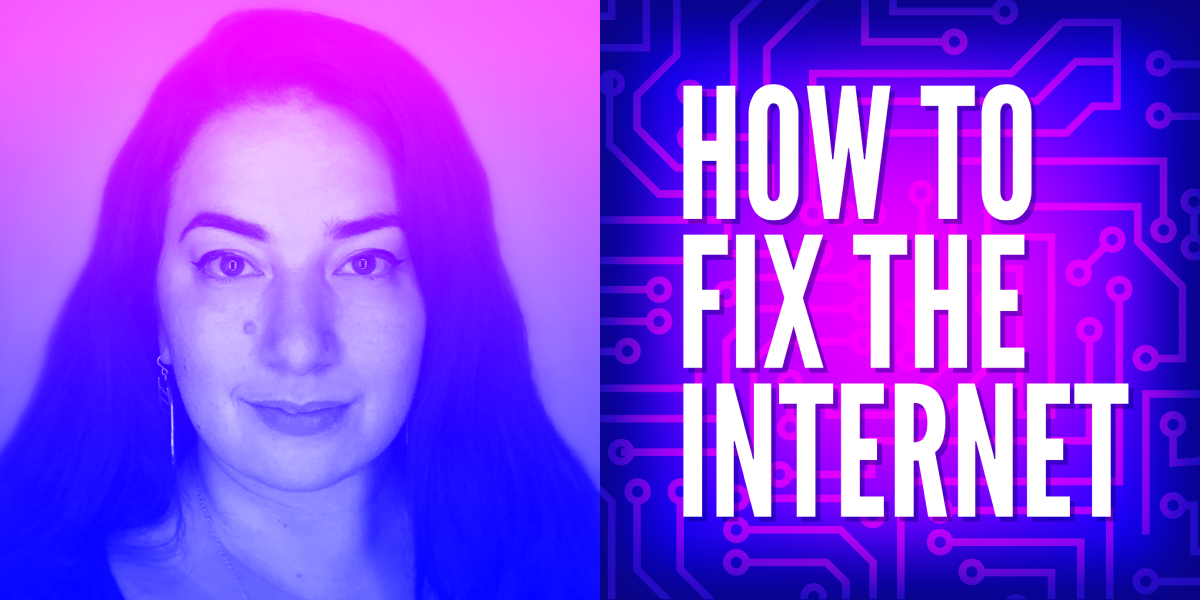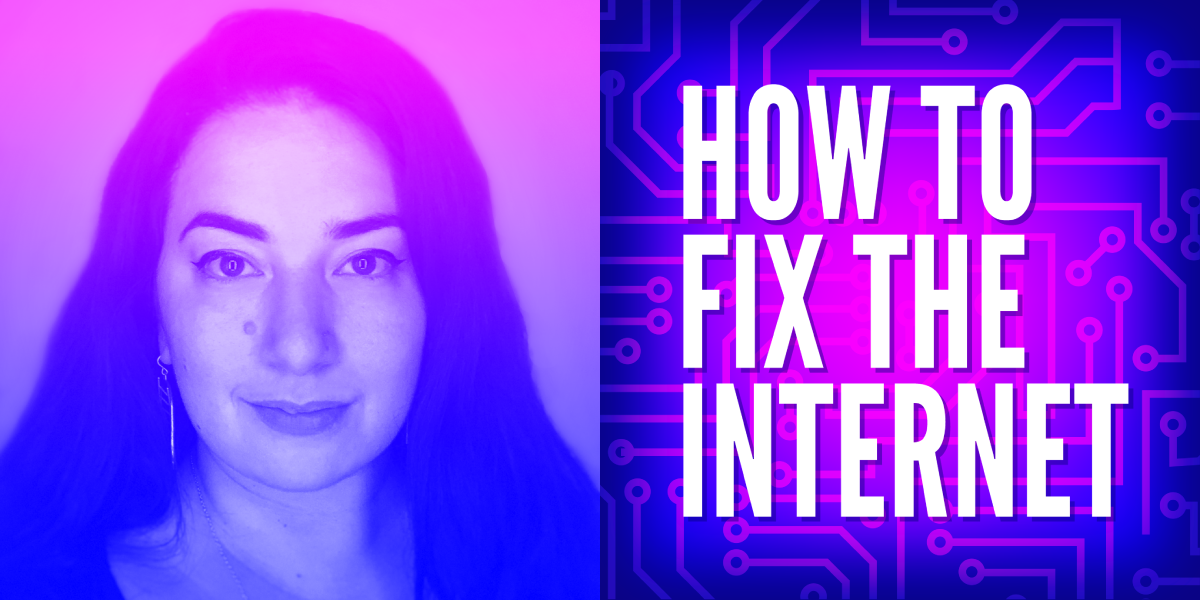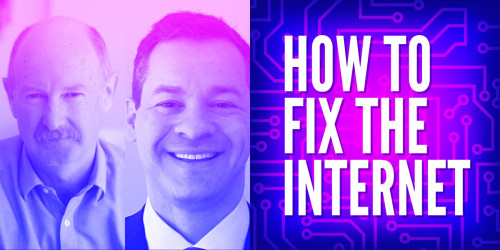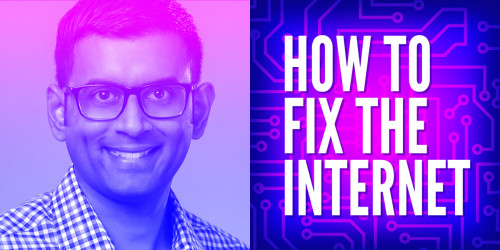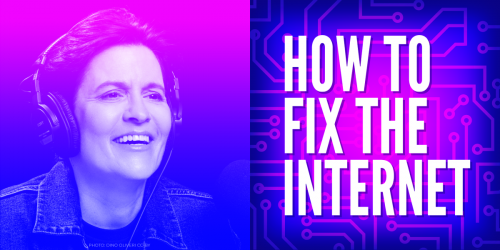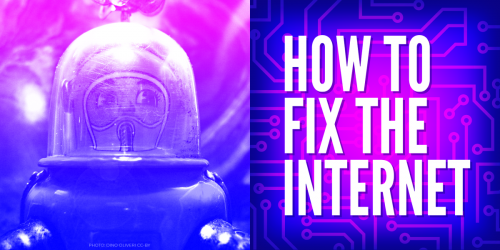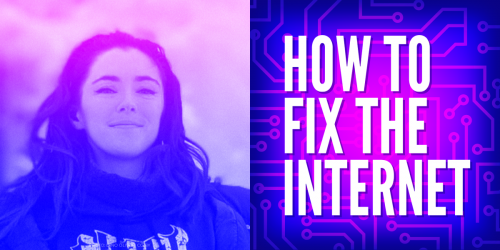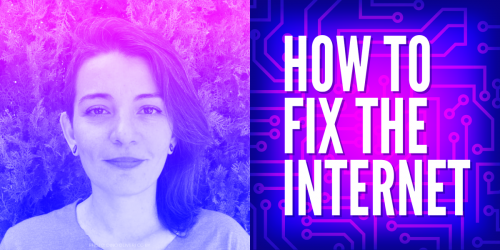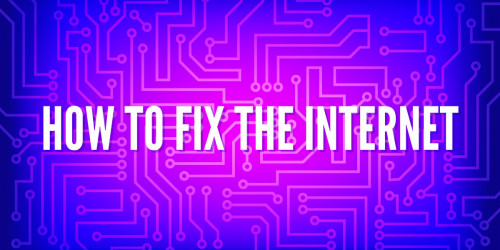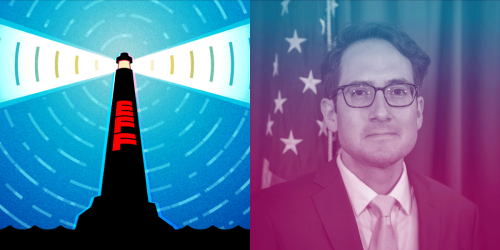We all leave digital trails as we navigate the internet – records of what we searched for, what we bought, who we talked to, where we went or want to go in the real world – and those trails usually are owned by the big corporations behind the platforms we use. But what if we valued our digital autonomy the way that we do our bodily autonomy? What if we reclaimed the right to go, read, see, do and be what we wish online as we try to do offline? Moreover, what if we saw digital autonomy and bodily autonomy as two sides of the same coin – inseparable?

(You can also find this episode on the Internet Archive and on YouTube.)
Kate Bertash wants that digital autonomy for all of us, and she pursues it in many different ways – from teaching abortion providers and activists how to protect themselves online, to helping people stymie the myriad surveillance technologies that watch and follow us in our communities. She joins EFF’s Cindy Cohn and Jason Kelley to discuss how creativity and community can align to center people in the digital world and make us freer both online and offline.
In this episode you’ll learn about:
- Why it’s important for local communities to collaboratively discuss and decide whether and how much they want to be surveilled
- How the digital era has blurred the bright line between public and private spaces
- Why we can’t surveil ourselves to safety
- How DefCon – America's biggest hacker conference – embodies the ideal that we don’t have to simply accept technology as it’s given to us, but instead can break, tinker with, and rebuild it to meet our needs
- Why building community helps us move beyond hopelessness to build and disseminate technology that helps protects everyone’s privacy
Kate Bertash works at the intersection of tech, privacy, art, and organizing. She directs the Digital Defense Fund, launched in 2017 to meet the abortion rights and bodily autonomy movements’ increased need for security and technology resources after the 2016 election. This multidisciplinary team of organizers, engineers, designers, abortion fund and practical support volunteers provides digital security evaluations, conducts staff training, maintains a library of go-to resources on reproductive justice and digital privacy, and builds software for abortion access, bodily autonomy, and pro-democracy organizations. Bertash also engages in various multidisciplinary civic tech projects as a project manager, volunteer, activist, and artist; she’s especially interested in ways that artistic methods can interrogate use of AI-driven computer vision, other analytical technologies in surveillance, and related intersections with our civil rights.
Resources:
- Digital Defense Fund and its 2022 EFF Award
- Dobbs v. Jackson Women’s Health Organization (U.S. Supreme Court No. 19–1392, decided June 24, 2022)
- EFF: Two Years Post-Roe: A Better Understanding of Digital Threats
- EFF: Surveillance Self-Defense
- DEF CON
What do you think of “How to Fix the Internet?” Share your feedback here.
Transcript
KATE BERTASH: It is me, having my experience, like walking through these spaces, and so much of that privacy, right, should, like, treat me as if my digital autonomy in this space is as important as my bodily autonomy in the world.
I think it's totally possible. I have such amazing optimism for the idea of reclaiming our digital autonomy and understanding that it is like the you that moves through the world in this way, rather than just some like shoddy facsimile or some, like, shadow of you.
CINDY COHN: That’s Kate Bertash speaking about how the world will be better when we recognize that our digital selves and our physical selves are the same, and that reclaiming our digital autonomy is a necessary part of reclaiming our bodily autonomy. And that’s especially true for the people she focuses on helping, people who are seeking reproductive assistance.
I’m Cindy Cohn, the executive director of the Electronic Frontier Foundation.
JASON KELLEY: And I’m Jason Kelley – EFF’s Activism Director. This is our podcast series How to Fix the Internet.
CINDY COHN: The idea behind this show is that we're trying to make our digital lives BETTER. Now a big part of our job at EFF is to envision the ways things can go wrong online-- and jumping into the action to help when things then DO go wrong.
But this show is about optimism, hope and solutions – we want to share visions of what it looks like when we get it right.
JASON KELLEY: Our guest today is someone who has been tirelessly fighting for the safety and privacy of a very vulnerable group of people for many years – and she does so with compassion, creativity and joy.
CINDY COHN: Kate Bertash is a major force in the world of digital privacy and security. Her work with the Digital Defense Fund started in 2017 as a resource to help serve the digital security needs of people seeking abortions and other reproductive care, and they have \ expanded their purview to include trans rights, elections integrity, harm reduction and other areas that are crucial to an equitable and functional democratic society. She’s also an artist, with a clothing line called Adversarial Fashion. She designs clothes that do all sorts of deliciously sneaky things – like triggering automatic license plate readers, or injecting junk data into invasive state and corporate monitoring systems. We’re just delighted to have her with us today - welcome Kate!
KATE BERTASH: Thank you so much for having me on. What an introduction.
CINDY COHN: Well, let's start with your day job, privacy and reproductive rights. You've been doing this since long before it became, you know, such a national crisis. Tell us about the Digital Defense Fund.
KATE BERTASH: So after Donald Trump was elected in 2016, I had started running some, what I would call tech volunteering events, the most well known of which is the Abortion Access Hackathon in San Francisco, we had about 700 people apply to come and hundreds of people over the weekend who basically were able to help people with very functional requests.
So we went to different organizations in the area and worked to ensure that they could get help with, you know, turning a spreadsheet into a database or getting help working on open source that they use for case management, or fixing something that was broken in their sales force. So, very functional stuff.
And then I was approached after that and asked if I wanted to run this new fund, the Digital Defense Fund. So we spent the first couple years kind of figuring out what the fund was going to do, but sort of organically and learning basically from the people that we serve and the organizations that work at Abortion Access, we now have this model where we can provide hands-on, totally free digital security and privacy support to organizations working in the field.
We provide everything from digital security evaluations to trainings. We do a lot of project management, connecting folks with different kinds of vendor software, community support, a lot of professional development.
And I think probably the best part is we also get to help them fund those improvements. So I know we always talk a lot about how things can improve, but I think kind of seeing it through, uh, and getting to watch people actually, you know, install things and turn them on and learn how to be their own experts has been a really incredible experience. So I can't believe that was eight years ago.
JASON KELLEY: You know a lot has changed in eight years, we had the Dobbs decision, um, that happened under the Biden administration, and now we've got the Dobbs decision, under a Trump administration. I assume that, you know, your work has changed a lot. Like at EFF we've been doing some work, with the Repro Uncensored Coalition tracking the changes in take downs of abortion related content. And that is a hard thing to do just for, you know, all the reasons, um, that it, you know, tracking what systems take down is sort of a thing you have to do one at a time and just put the data together. But for you, I mean, out of eight years, you know what's different now than, than maybe not 2017 or, but, but certainly, you know, 2022.
KATE BERTASH: I think this is a really excellent question just because I think it's kind of strange to look backwards and, and know that, uh, abortion access is a really interesting space in that for decades it's been under various kinds of different legal, and I would say ideological attacks as well as, you know, dealing with the kind of common problems of nonprofits, usually funding, often being targets of financial scams and crime as all nonprofits are.
But I think the biggest change has been that, um, a lot of folks who I think sort of. Could always lean on the idea that abortion would be federally legal, and so your job may be helping people get their abortions or performing abortions or supporting folks with funding to get to their procedures, that that always sort of had this like, color of law that would always kind of back you up or provide for you a certain level of security.
Um, now we kind of don't have that safety, mentally, even to lean on anymore as well as legally. And so a lot of the meat and potatoes of the work that we do, um, often it was always about, you know, ensuring patient privacy. But a lot of times now it's also ensuring that organizations are kind of ready to ask and answer kind of hard questions about how they wanna work. What data is at risk when so much is uncertain in a legal space?
Because I think, you know, I hardly have to tell anybody at EFF that, often, uh, we kind of don't know what, what quote unquote qualifies or what is legal under a particular new law or statute until somebody makes you prove it in court.
And I think a lot of our job at Digital Defense Fund really then crystallized into what we can do to help people sort of tolerate this level of uncertainty and ensure that your tools and that your tactics and your understanding even of the environment that you're operating in at least buoys you and is a source of certainty and safety when the world cannot be.
CINDY COHN: Oh, I think that's great. Do you have a, an example?
KATE BERTASH: Yes, absolutely. I think one of the biggest changes that I've seen in how people tend to work and operate is that, uh, I think you know, this kind of backs into many other topics that I know get discussed on this podcast, which is that when we reach into our pocket for the computer that is on us all day, you know, our phone and we reach out to text people, it's, it's a very accessible way to reach somebody and trying to really wrap around the understanding of the difference between sending an SMS text message to somebody, or responding to a text message asking about services that your organization provides or where to get an abortion or something like that, and the difference of how much information is kept, for example, by your cell phone carrier. Usually, you know, as all of you have taught all of us very well, uh, in plain text as far as we know forever.
Uh, and the absolute huge difference then of getting to really inform people about this sort of static understanding of our environment that we operate in, that we kind of take for granted every day, when we're just like texting our friends or, you know, getting a message about whether something's ready for pickup at the pharmacy. Uh, and then instead we get to help move people onto other tools, encrypted chat like Signal or Wire or whatever meets their needs, helping meet people where they're at on other platforms like WhatsApp, and to really not just like tell people these are the quote unquote correct tools to use, because certainly there are many great, uh, you know, all loads roads lead to Rome as they say.
But I think getting to improve people's sort of environmental understanding of the ocean that we're all swimming in, uh, that it actually doesn't have to work this way, but that these are also the results of systems that, are motivated by capital and how you make money off of data. And so I think trying to help people to be prepared then to make different decisions when they encounter new questions or new technologies has been a really, really big piece of it. And I love that it gets to start with something as simple as, you know, a safer place to have a sensitive conversation in a text message on your phone in a place like Signal. So, yeah.
CINDY COHN: Yeah, no, I think that makes such sense. And we've seen this, right? I mean, you know, we had a mother in Nebraska who went to jail because she used Facebook to communicate with her daughter, I believe about getting reproductive help. And the shifting to a just a different platform might've changed that story quite a bit because, you know, Facebook had this information and, you know, one of the things that, you know, we know as lawyers is that like when Facebook gets a subpoena or process asking for information about a user, the government doesn't have to tell them what the prosecution is for, right? So that, you know, it could be a bank robber or it could be a person seeking reproductive help. The company is not in a position to really know that. Now we've worked in a couple places to create situations in which if the company does happen to know for some reason they can resist.
But the way that the baseline legal system works means that we can't just, you know, uh, as much as I love to blame Facebook, we can't blame Facebook for this. We need actual tools that help protect people from the jump.
KATE BERTASH: Absolutely, and I think that case is a really important example of, especially I think, how unclear it is from platform to platform, sort of how that information is kept and used.
I think one of the really tragic things about that conversation was that it was a very loving conversation. It was the kind of experience I think that you would want to have between a parent and child to be able to be there for each other. And they were even to talking to each other while they were in the same house. So they were just sharing a conversation from one room to the next. And that's something that I think like, to see the reaction the public had to, that I think, was very affirming to me that, that it was wrong, uh, that, you know, that just the way that this platform is structured somehow then, uh, put this extra amount of risk on this family.
I think, because, you know, we can imagine that it should be a common experience or common right to just have a simple conversation within your household and to know that like that's in a safe place, that that's treated with the sensitivity that it deserves. And I think it helps us to understand that. You know, we are actually, and I mean this in a good sense of the word, entitled to that, and I know that seeing actually, uh, Meta respond to the sort of outcry, there was also a very, like, positive flag for me, because they don't typically respond to, uh, their, their comms department does not typically respond to any individual subpoena that they received, but they felt they had to come out and say why they responded and what the, the problem was there. Um, I think as sort of an indication that this is important.
These different kinds of cases that come up, especially around abortion and criminalization, one of the reasons I think they're so important for us to cover is that, you know, on this podcast or within the spaces that both you and I work with so much about digital security and privacy kind of exists in this very like cloudy, theoretical space.
Like we have these, like, ideals of what we know we want to be true and, and often, you know, when you, when you're talking to folks about like big data, it's literally so large that it can be hard to like pin it down and decide how you feel. But these cases, they provide these concrete examples of how you think the world actually should or should not work.
And it really nails it down and lets people form these very strong emotional responses to it. Um, that's why I'm so grateful that, um, you know, organizations like yours get to help us contextualize that like, yes, there's this like, really personal, uh, and, and tragic story – and it also takes place within this larger conversation around your digital civil liberties.
CINDY COHN: Yeah, so let's flip that around a little bit. I've heard you talk about this before, which is, what would the world look like if our technologies actually stood up for us in these contexts? And, you know, inside the home is a very particular one. And I think because the Fourth Amendment is really clear about the need for privacy. It's one of the places where privacy is actually in our constitution, but I think we're having a broader conversation, like what would the world look like if the tools protected us in these times?
KATE BERTASH: I think especially, it's really interesting to think about the, the problems that I know I've learned so much from your team around the, the problem of what is public and what is private. I think, you know, we always talk about abortion access as a right to privacy and then it suddenly exists in this space where we kind of really haven't decided what that means, and especially anything that's very fuzzy about that.
People are often very familiar with the image of the protestor outside of the abortion clinic. There are many of the same problems kind of wrapped up in the fact that protestors will often film or take photographs or write down the license plates of people who are going in and out of clinics, often for a variety of reasons, but mostly to surveil them in in some way that we actually see then from state actors or from corporations, this is done on a very personal basis.
And it has a lot of that same level of damage. And we frequently have had to capitulate that like, well, this is a public space, you know, people can take photos in, in a public area, and that information that is taken about your personal abortion experience is unfortunately, you know, can be used and, and misused in, in whatever way people want.
And then we watched that exact same problem map itself onto the online space. So yeah, very important to me.
CINDY COHN: I think this is one of the fundamental, things that the digital era brought us was an increasing recognition that this bright line between public spaces and private spaces isn't working.
And so we need a more, you know, it's not like there aren't public spaces online. I definitely want reporters to be able to, you know. Do investigations that give us information about people in power and, and what they're doing. Um, so it's not, it's, it's not either or, right, and I think that's the thing we have to have a more nuanced conversation about what public spaces. Are really not public in the context. You know, what we think of as Bright Line public spaces aren't really rightfully treated as public. And I love your reframing about this as being about us. It's about us and our lives.
KATE BERTASH: Absolutely. Uh, I think one of the larger kind of examples that has come up also as well, uh, is that your experience of seeking out medical care actually then travels into the domain of, of the doctor that you see they often use in electronic health records system. And so you have this record of something that I don't think any of these companies were really quite adequately prepared for, for the policy eventuality that they would be holding information that would be an enshrined human right in some states’ constitutions, but a crime in a different state. And you know, you have these products like Epic Everywhere, and they allow access to that same information from a variety of places, including from a state where, you know, that, to that state, it is evidence of a crime to have this in the health record versus just it's, you know, a normal continuity of care in a different state.
And kind of seeing how, you know, we tend to have these sort of debates and understandings and trying to, like you say, examine the nuance and get to the bottom of how we wanna live in these different contexts of policy or in court cases. But then so much of it is held in this corporate space and I think they really are not. Ready for the fact that they are going to have to take a much more active role, I think, than they even want to, uh, in understanding how that shows up for us.
JASON KELLEY: Let’s take a quick moment to say thank you to our sponsor.
“How to Fix the Internet” is supported by The Alfred P. Sloan Foundation’s Program in Public Understanding of Science and Technology. Enriching people’s lives through a keener appreciation of our increasingly technological world and portraying the complex humanity of scientists, engineers, and mathematicians.
We also want to thank EFF members and donors. You’re the reason that we exist. You can become a member if you’re not for just $25 and for a little more you can get some great, very stylish gear. The more members we have, the more power we have - in statehouses, courthouses, and on the streets. EFF has been fighting for digital rights for decades, and that fight is bigger than ever, so please, if you like what we do, go to eff.org/pod to donate.
And now back to our conversation with Kate Bertash.
So we've been talking a lot about the skills and wisdom that you've learned during the fight for reproductive rights, but I know a lot of that can be used in other areas as well. And I heard recently that you live in a pretty small rural town, and not all your neighbours share your political views. But you've been building sort of a local movement to fight surveillance there – and I’d love to hear about how you are bringing together different people with different sort of political alignments to come together on this privacy issue.
KATE BERTASH: Yeah, it actually had started so many years ago with Dave Moss, who's on the EFF team and I having a conversation about the license plate surveillance actually at clinics and, and kind of how that's affected by the proliferation of automated license plate reader technology. And I had come up with this, this like line of clothing called Adversarial Fashion, which, uh, injects junk into automated license plate readers.
It was a really fun project. I was really happy to see the public response to it, but as a result, I sort of learned a lot about these systems and kind of became a bit of an activist on the privacy issues around them.
And then suddenly, I now live in a rural community in southwest Washington and I then suddenly found out on Facebook one day that our sheriff's department had purchased Flock automated license plate reader cameras, and just installed them already and just announced it. Like there was no public discussion, no debate, no nothing. There had been debate in neighboring counties where they decided, oh, kind of not for us. You know, where a lot of rural communities, uh, and, and like, I wanna give you a sense of the size. Our county has 12,000 people in it. My town has a thousand people in it. So very tiny, like, you kind of almost wonder why you would even need license plate for surveillance when you could just like literally ask almost anybody what's going on with, like, I've seen people before on, on Facebook where they're like, Hey, is this your car? You know, somebody stole it. Come pick it up. It's on our, on our hill.
CINDY COHN: I grew up in a very small town in Iowa and the saying in our town was, you know, you don't need turn signals 'cause everybody knows where you're going.
KATE BERTASH: I love that. See exactly like I did not know that about you, Cindy. I love that. And that was kind of this initiating, uh, event where I was just, I, I'll be honest with you, I totally hit the ceiling. What I found out I was, I was really mad because, you know, you are active on all this stuff outside of, you know, your work and your, you know, I've been all over the country talking about the problems with this technology and the privacy issues that it raises and you know, how tech companies take advantage of communities and here they were taking advantage of my community.
It's like, not in my house! How is it in my house?
JASON KELLEY: Well, when did this happen? When? When did they install these?
KATE BERTASH: Oh my gosh, it had to be a couple of months ago. I mean, it was very, very recently. Yeah, it was super recently, and so I kind of did what I know best, which is that I took everything that I learned, I put it into a presentation to my neighbors. I scheduled a bunch of nights at the different libraries and community centers in my county, and invited everybody to come, and the sheriff and the undersheriff came too.
And the most surprising thing about this was that I think, A, that people showed up. I was actually very pleasantly surprised. I think a lot of people, when they move to rural areas, they do so because, you know, they want to feel freer to be not, you know, watched every day by the state or by corporations, or even by their neighbors, frankly.
And so it was really surprising to me when, this is probably the most politically diverse room I've ever presented to. And definitely people that I think would absolutely not love any of my rest of my politics, but both nights, one hundred percent of the room was in agreement that they did not like these cameras, did not think that they were a good fit for our community, that they don't really appreciate, you know, not being asked.
I think that was kind of the core thing we wanted to get through is that even if you do decide these are a good fit. We should have been asked first, and I got people, shaking my hands afterwards. We're like, thank you young lady for bringing up this important issue.
Um, it's still ongoing. We haven't had all of them. Some of them have been removed, uh, but not all of them. And I think there's a lot closer scrutiny now on like the disclosure page that Flock puts up where you get to see kind of how the data is accessed. Uh, but I think it was like, you know, I've been doing this like privacy and safety work for a while, but it made me realize I still have room to be surprised, and I think that like I was surprised that everybody in my community was very united on privacy. It might be the thing on which we most agree, and that was like so heartwarming in such a way. I really can't wait to keep, keep building on that and using it as a way to connect with people.
CINDY COHN: So I'd like to follow up because we've been working hard to try to figure out how to convince people that you can't surveil yourself to safety, right? This stuff is always promoted as if it's going to make us safe. What stories did you hear that were resonating with people? What was the counter story from, you know, surveillance equals safety.
KATE BERTASH: I think the biggest story that I knew really connected with folks was actually the way in which that data was shared outside of our community. And there was somebody who was sitting in the room who I think had elaborated to that point that she said. I might like you as the sheriff, you know, these are all people who voted for the sheriff. We got to actually have this conversation face to face, which was really quite amazing. And they got to say to the sheriff, I voted for you. I might like you just fine. I might think you would be responsible logging into this stuff, but I don't know all those people who these platforms share this stuff with.
And Flock actually shares your data, unless you specifically request that they turn it off, and I think that was where they were like, you know, I don't trust those people, I don't know those people.
I also don't know your successor. Who's gonna get this? If we give this power to this office, I might not trust the future sheriff as much. And in a small town, like, that personal relationship matters a lot. And I think it was like really helpful to kind of take it out of this, you know, I am obviously very concerned about the ways in which they're, you know, abusive of policing technology and power. I think though, because like so many of these people are people who are your neighbors and you know them, it was so helpful to kind of put it in terms of like, you know, I don't want you to think it's about whether or not I trust your confidence personally.
It's about rather what we maybe owe each other. And you know, I wish you had asked me first, and it became a very like, powerful personal experience and a personal narrative. And, and I think even at the end of the night, like by the second night, I think the sheriff's department had really changed their tune a lot.
And I said to them, I was like, this is the longest we've ever gotten to talk to each other. And I think that's a great thing.
CINDY COHN: I think that's really great. And what I love about this is landing, it really, you know, community has come up over and over again in the way that we've talked to different people about what's important about making technology serve people.
KATE BERTASH: Yeah, people make these decisions very emotionally. And I think it was really nice to be able to talk about trust and relationships and communication because so much of the conversation when it's just held online, gets pulled into, I think everybody in this room our least favorite phrase. If you're not doing anything wrong, why do you care about being surveilled?
And it's just sort of like, well, it's not about whether or not I'm committing a crime. It's about whether or not, you know, we've had a discussion about what we should all know about each other, or like, why don't you just come over and ask me first.
I still want our community to have the ability to get people’s stolen cars back or to like find somebody who is like a, a lost senior adult or, or a child who's been abducted, you know? But these are like problems. Then we get to solve together rather than in this like adversarial manner where everybody's an obstacle to some public good.
JASON KELLEY: One of the things that I think a lot of the people we talk with, but I think you in particular are bringing to this conversation is, I don't know, optimism, joy, creativity.
You're someone who is dealing with some complicated, difficult, often depressing stuff. And you think about how to get people involved in ways that aren't, you know, uh, using the word dystopia, which is a word we use too much at e fff because it's too often becoming true. Cindy, I think mentioned earlier the adversarial fashion line. I think you've done a lot of work in getting people who aren't necessarily engineers thinking about like data issues clearly.
Tell us a little bit about the adversarial fashion work and also just, you know, how we get more people involved in protecting privacy that aren't necessarily the ones working at Facebook, right?
KATE BERTASH: So one of the most fun things about the adversarial fashion line, uh, was in, in kind of researching how I was gonna do that. The reason I did it is because I actually spent some of my free time designing fabrics, like mostly stuff with little, you know, manatees or cats on them, like silly things for kids.
And so I was like, yeah, it's, it's a surface pattern. I could definitely do that. Seems easy. Uh, and I got to research and find out more about sort of the role that art has in a lot of anti-surveillance movements. There's a lot of really cool anti surveillance art projects. Uh, it has been amazing as I present adversarial fashion, uh, in different places to kinda show off how that works.
So the way that the adversarial fashion line works is that these clothes have basically, you know, see these sort of iterations of what kind of look like plates on them. And automated license plate readers are kind of interesting in that they're, what I guess the system with low specificity is, is the way that a software engineer might term it, which is that they are working on a highway at, you know, 60, 70 miles an hour.
They're ingesting hundreds, sometimes thousands of plates a minute. So they really have to just be generous in what they're willing to ingest. So they, they put the vacuum and things like picket fences and billboards. And so clothing was kind of trivial, frankly, to get them to pick that up as well.
And what was really nice about the example of, you know, like a shirt that. You know, could be read as a car by some of these systems. And it was very easy to show, especially on some of the open source systems that are the exact same models deployed in surveillance technology that's bought and sold, uh, that, you know, you would really think differently than about your plate being seen someplace as sort of something that might implicate you in a crime or determine a pattern of behavior or justify somebody surveilling you further if it can be fooled by a t-shirt.
And you know, much like the example we talked about, uh, with, you know, conversations being held on a place like Facebook, anti surveillance artworks are cool in that they get to help people who feel like they're not technical enough or they don't really understand the underlying pieces of technology to have a concrete example that they can form a really strong reaction to. I know that some of the people who had really thrilled me that they were very excited about were like criminal defense attorneys reached out and asked a bunch of questions.
We have a lot of other people who are artists or designers who are like, how did you learn to use these systems? Did you need to know how to code? And I'm like, no, you can just roll them up on, you know, there's actually a bunch of a LPR apps that are available on, you know, the Apple store or that you can use on your computer, on your phone and test out the things that you've made.
And this actually works for many other systems. So, you know, facial recognition systems, if you wanna play around and come up with really great, you know. Clothing or masks or makeup or something, you can actually test it with the facial recognition piece of Instagram or any of these different types of applications.
It's a lot of fun. I love getting to answer people's questions. I love seeing the kind of creative spark that they're like, oh yeah, maybe I am smart enough to understand this, or to try and fool it on my own. Or know that like these systems aren't maybe as complex or smart as I give them credit for.
JASON KELLEY: What I like about this especially is that you are, you know, pointing out that this stuff is actually not that complicated and we've moved into a world where often the kind of digital spaces we live in, the technology we use feels so opaque that people can't even understand how to begin to like modify it, or to understand how it works or how they would build it themselves.
It's something we've been talking about with other people about how there's sort of like a moment where you realize that you can modify the digital world or that you can. You, you know how it works. Was there a moment in your work or in your life, um, where you realized that you could sort of understand that technology was there FOR you, not just there like to be thrust upon you?
KATE BERTASH: You know, it might be a little bit late in my life, but I think when I first got this job and I was like, oh my gosh, what am I going to do to really help kind of break through the many types of like privacy and safety problems that are facing this community, somebody had said, Kate, you should go to Def Con, and I went to Def Con, my very first one, and I was like blown back in my chair.
Defcon is America's largest hacker conference. It takes place every single year in Las Vegas and I think going there, you see, not only are these presentations on things that people have broken, but then there are places called villages that you walk through and people show you how to break systems or why, actually, it should be a lot harder to break this than it is.
Like the voting village. They buy old voting machines off of eBay and then, you know, teach everyone who walks in within, you know, 20 minutes how you can break into a voting machine. And it was just this, like, moment where I realized that you don't have to take technology as it is given to you. We all deserve technology that has our back and, and can't be modified or broken to hurt us.
And you can do that by yourself, sort of like actively tinkering on it. And I think that spirit of irreverence Really carried through to a lot of the work that we do with Digital Defense Fund, where we get people all the time who, like, they come in and they are worried about absolutely everything. It's so hard to decide what bite of the elephant to take first on, you know, improving the safety and privacy for the team and how they work and the patients that they serve.
But then we get to kind of show people some great examples of how actually this. Isn't quite as complicated as you might think. I'm gonna walk you through sort of the difference of like getting to use, like, one app text versus another, or turning on two factor.
We love tools like have I been pwned because they kind of help shape that understanding. You know, like you think about how a hacker gets a password, it feels so abstract or like technical, and then you realize, oh, actually when somebody breaks these, they buy and sell them, and then somebody just takes old passwords and reuses them.
That seems far more intuitive. I can now understand the ecosystem and the logic that's used behind so much of security and it builds on itself. And I think the thing that I'm most proud of is that we not only have this community of folks that we've worked with to improve their safety that we introduced to personal, you know, professional development opportunities to keep growing that understanding. We also manage an amazing community of technologists who build their own systems.
There's one group called the DC Abortion Fund who built their own case management platform because they were not being served by any of these corporate or enterprise options that charge way too much. They have like, you know, dozens of case managers, so that many seats was never gonna be affordable. And so they just sat down and they, you know, worked with Code For DC and they built it out, hand in hand.
And that is a project that I always point to as like, you know, it took somebody saying to themselves, I deserve better than this, and I can learn from everything I like about, you know, systems that you can buy and sell, but also like our community's gonna build what we need.
And to be supported to do that and have that encouragement is, is one of the reasons that I'm so proud that, um, over these years, the number of sort of self-built and community built software projects and other types of like ways that people deploy more secure technology to each other and teach each other has grown by leaps and bounds.
My job is so different now than what it was eight years ago because people are hungry for it. They know that they are, you know, ready to become their own experts in their communities. And the requests that we get then for, for more train the trainer type of material, or to help equip people to bring this back to their space the way, you know, I brought my ALPR presentation back to my own community. It's great to see that everyone is so much more encouraged, especially in these times when like systems are unstable, nonprofits spin up and down. We all have funding problems that have very little often to do with the demand for those resources, that that's not the end of the story.
So, yeah, I love it. It's been a wonderful journey, seeing how everything has changed from, like you said, that spirit of, of being always worried that things are getting worse, focusing on this dystopia, to seeing sort of, you know, how our own community has expanded its imagination. It's really wonderful. //
CINDY COHN: What a joy it is to talk to someone like Kate. She brings this spirit of irreverence that I think is great that she centers on Defcon because that's a community that definitely takes security seriously, but don't take themselves very seriously. So I really, I love that attitude and how important that is, I hear, for building community, building resilience through what are pretty dark times for the community that she fundamentally, you know, works with.
JASON KELLEY: And building that understanding that you have the not just ability, but like the right to work with the technology that is presented to you and to understand it and to take it apart and to rebuild it. All of that is, I think, critical to, you know, building the better internet that we want.
And Kate really shows how just, you know, going to the DEF Con Village can change your whole mind about that sort of thing, and hopefully people who don't have technical skills will recognize that you actually don't necessarily need them to do what she's describing. That's another thing that she said that I really liked, which is this, that, you know, she could show up in a room and talk to 40 people about surveillance and she doesn't have to talk about it at a, you know, technical level really, just saying, Hey, here's how this works. Did you know that? And anyone can do that. You know, you just have to show up.
CINDY COHN: Yeah. And how important these, like hyperlocal conversations are to really getting a handle on combating this idea that we can surveil ourselves to safety. What I really loved about that story, about gathering her community together, including the sheriff, is that, you know, they actually had a real conversation about the impact of what the sheriff was, was, is doing with Alps and really were able to be like, you know, look, I want you to be able to catch people who are stealing cars, but also there are these other ramifications and really bringing it down to a human level as one of the ways we get people to kind of stop thinking that we can surveil ourselves to safety. Then that technology can just replace the kind of individual community-based conversations we need to have.
JASON KELLEY: Yeah. She really is maybe one of the best people I've ever spoken to at bringing it down to that human level.
CINDY COHN: I think of people like Kate as the connective tissue between the communities that really need technologies that serve them, and the people who either develop those technologies or think about them or advocacy groups like us who are kind of doing the policy level work or the national level or even international level work on this.
We need those, those bridges between the communities that need technologies and the people who really think about it in the kind of broader perspective or develop it and deploy it.
JASON KELLEY: I think the thing that I'm gonna take away from this most is again, just Kate's creativity and the fact that she's so optimistic and this is such a difficult topic and, and we're living in such, you know, easily described as dystopic times. Um, but, uh, she's sort of alive with the idea that it doesn't have to be that way, which is really the, the whole point of the podcast. So she embodied it really well.
CINDY COHN: Yep. And this season we're gonna be really featuring the technologies of freedom, the technologies we need in these particular times.
And Kate is just one example of so many people who are really bright spots here and pointing the way to, you know, how we can fix the internet and build ourselves a better future.
JASON KELLEY: Thanks for joining us for this episode – and this new season! – of How to Fix the Internet.
If you have feedback or suggestions, we'd love to hear from you. Visit EFF dot org slash podcast and click on listener feedback. While you're there, you can become a member, donate, maybe even pick up some merch and just see what's happening in digital rights this week and every week.
Our theme music is by Nat Keefe of BeatMower with Reed Mathis
How to Fix the Internet is supported by the Alfred P. Sloan Foundation's program in public understanding of science and technology.
We’ll see you next time.
I’m Jason Kelley.
CINDY COHN: And I’m Cindy Cohn.


